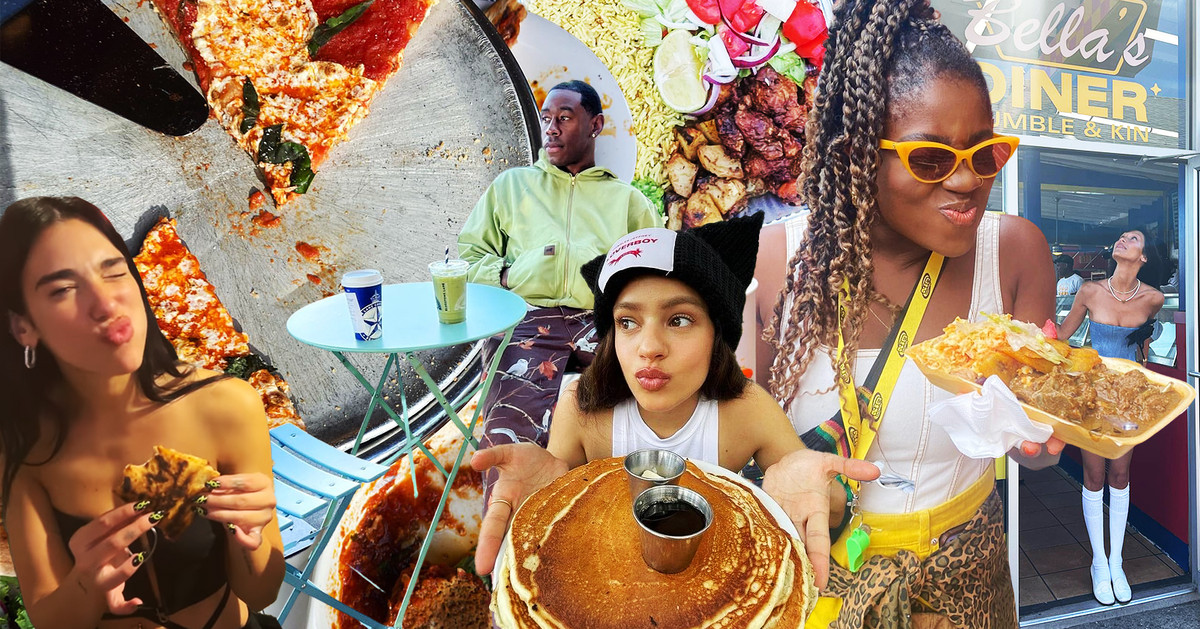
ICYMI, there was a vibe shift this year. But that didn’t just happen in fashion — it was in food, too. Taste is always driving food culture — but it now goes beyond what we put in our mouths. Thanks to social media, we have a lens to look at what we eat, what it looks like, where we eat, and even how we eat. Here’s how that has evolved over the last twelve months.
The feed still feeds us
There’s a lot of chatter about how Instagram is dead, but one billion monthly users scroll the app every day — that’s 12.9 percent of the world’s population. Users still fall in line with aesthetic trends across the platform, and the London food scene is no less susceptible. In recent times, it felt like a meal didn’t happen unless it happened on Instagram.
Some venues have decor designed for a selfie backdrop — Gloria in Shoreditch, the Prada-owned Marchesi pasticceria — but the app also acts as a sort of word-of-mouth accelerator. Spots like Max’s Sandwich Shop, Berenjak, and Rita’s have grown, thanks to either a seal of approval from a supermodel, or a bounce in hype. Just like that, a waitlist becomes standard.
RIP the food post. Long live the food post
If Instagram is still where we see most images of food, the aesthetic of those images is changing. If, once, plates were viewed from above, perfectly tablescaped, and closer to a photo on a restaurant’s website than one of a much-enjoyed dinner, a more ‘real’ aesthetic spiked this summer, as the selfie has evolved from filtered perfection to a blurred end-of-the-night candid shot. The clumsy photos that would usually be deleted are now posted to main feeds, and a half-eaten, but mouthwatering meal is the way for a chef to promote a dish.
One Eater writer referred to this as “Instagram food’s laissez-faire era,” referencing Taylor Lorenz’s article which announced “The Instagram Aesthetic is Over” back in 2019 — referring to the glossy look. The photo dump (still on Instagram, of course) is its replacement. Tastemakers of a fashionable feed — from Dua Lipa to Bella Hadid and Tyler the Creator, Central Cee, Clara Amfo and Jeremy O. Harris — are now likely to post dumps (of a weekend, a festival, a month) with plates wiped clean, a close up of a distinctly non-glamorous takeaway container just one of the slides. The food shot is always part of the story. If, once, food was seen as something for the hoi polloi, celebrities and influencers are now as keen to show that they have been to a new hyped spot as they are to show off their latest garms.
:no_upscale()/cdn.vox-cdn.com/uploads/chorus_asset/file/24304843/bella_hadid_knicks_hot_dog.jpg)
Other apps flex their influence
TikTok has previously been seen as the relatable ying to Instagram’s yang, with the less glossy aesthetic arguably influencing more at-home videos. But it was BeReal that really made an impact.
Originally launching in 2020, it took off this year. It was the most downloaded app in August, and it was third in the Apple store’s social media category, between WhatsApp and Facebook, by October. A photo sharing app that includes both a selfie and a shot of where the user happens to be, this is a more ‘real’ idea of your day — because you have to post anywhere you are — whether that’s the office, Session House, or that crap Tesco Extra in Haggerston.
BeReal’s look, and vibe, has migrated to Instagram, with users screenshotting BeReals from hyped restaurant tables, or dining tables covered with wfh detritus, and posting them to Stories. BeReal memes, such as one from the pov of Ratatouille’s Remy the Rat, were also a thing. And even England footballers posted some BeReal-like food updates from Qatar in November — see John Stones, Kyle Walker and Dave the cat at a very standard looking restaurant.
Welcome to the chaos era
In a very prescient essay in February, newsletter Blackbird Spyplane hailed the “ungrammable hang zone,” i.e. cafes, restaurants and bars that have never thought about what they look like in a 6cm x 7cm rectangle, and are all the better for it.
“Right now, in year ~15 of the fetish for ‘clean lines’ and ‘understated elegance,’ I wanna hang for hours in a FRUMPY, MISSHAPEN, INVITINGLY INELEGANT place,” wrote one half of the Spy Plane team, Jonah Weiner, waxing lyrical about deeply unphotogenic items, like plastic-wrapped giant cookies.
This idea is now running riot in the gleeful fetishisation of mess on social media — with a crushed beer preferred can over, say, a perfect cocktail, or a crumpled takeaway bag from Tayyabs over any immaculate table setting, a candid shot over anything too posed, and a shaky video over something with the production values of a Hollywood worthy short. Expect more — never less — in 2023.
